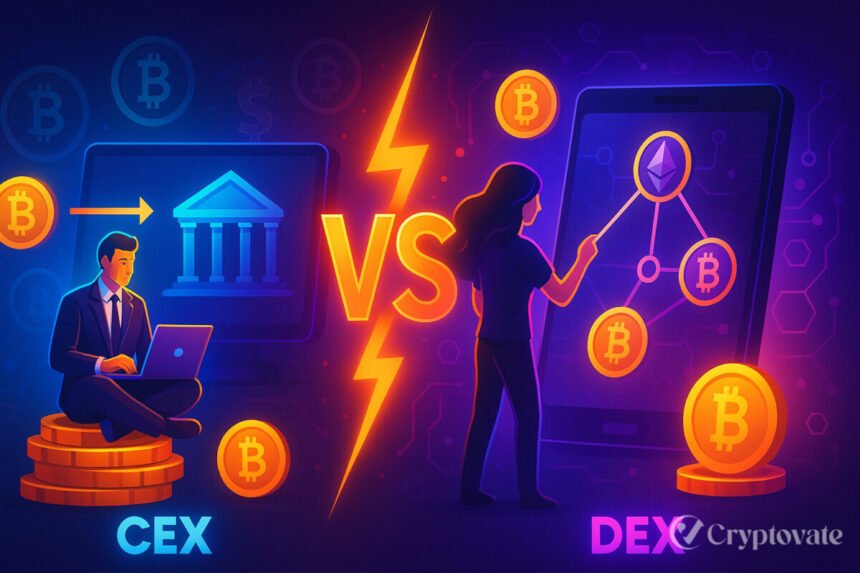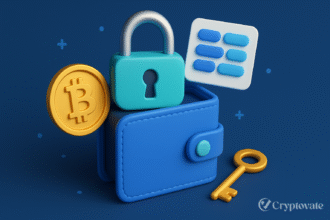– Ad –
| Getting your Trinity Audio player ready... |
CEX vs DEX — it’s one of the first decisions every crypto user has to make. Whether you’re trading meme coins for fun or stacking sats with a long-term vision, the type of exchange you choose shapes your entire crypto journey.
Are you into Web3? Then this is a convo worth having.
Centralized Exchanges offer convenience, speed, and fiat on-ramps. They’re great for beginners and power users alike — but they come with trade-offs like custodial risk and KYC. On the flip side, Decentralized Exchanges put you in full control. No middlemen, no gatekeepers. Just pure, peer-to-peer trading — but that also means you’re fully responsible for your own funds.
Not sure which one fits your style? You’re not alone. Let’s break it down together and help you figure out what aligns with your goals, values, and security preferences.
What Is a Centralized Exchange (CEX)?
If you’ve used platforms like Binance, Coinbase, or Kraken, you’ve already experienced a centralized exchange. These are traditional-style platforms where a company acts as the middleman. You deposit your crypto or fiat, trade through their order book, and withdraw when you’re done.
Why CEX Feels Easy (and Safe-ish)
- User-friendly UX: Great for beginners. Clean UI, fast onboarding.
- Liquidity: Deep liquidity means tighter spreads and faster trades.
- Support & Compliance: KYC, customer service, and (sometimes) regulatory protection.
But here’s the flip side: You don’t control your funds while they’re on the exchange. Not your keys, not your coins. And if the exchange gets hacked or goes bankrupt (as seen with FTX), you may be left in limbo.
What Is a Decentralized Exchange (DEX)?
A DEX, such as Uniswap or Pancakeswap, removes the need for any intermediaries entirely. It’s peer-to-peer. You connect your wallet, swap tokens, and you’re done. Your keys, your coins, your rules.
Why DEX Is for the Sovereign Minded
- Self-custody: You retain full control of your assets at all times.
- No KYC: Anonymous trading? Yes please.
- Access to new tokens early: Decentralized Exchanges often list tokens before Centralized Exchanges do.
But it’s not perfect. Slippage can be brutal. Gas fees on Ethereum can make you cry. And let’s be real—UI/UX still isn’t beginner-friendly across the board.
CEX vs DEX: The Real Tradeoffs
| Feature | CEX | DEX |
| Custody | Centralized | You own your keys |
| Ease of use | Super beginner-friendly | Takes time to get used to |
| Liquidity | Higher | Varies by pool |
| Token availability | Curated | Wide range, including risky ones |
| KYC/AML | Mandatory | Not required (yet) |
| Security risk | Platform risk | Smart contract risk |
So, Which One Should You Use?
Here’s the thing, it’s not either-or. It’s both. Most serious traders use CEXs for major trades and on-ramps/off-ramps, and DEXs for DeFi, NFTs, or those juicy altcoin plays.
Ask yourself:
- Are you just starting out and need ease + support? → Go with a Centralized Exchange.
- Prefer to stay anonymous and manage your assets yourself? → Decentralized Exchange is your best bet.
- Want the best of both worlds? Use both strategically.
How to decide: what matters to you?
Here’s what this really means:
- Need speed and convenience? Go Centralized Exchange.
- Value privacy and control more? Go Decentralized Exchange.
- Trading rare or new tokens? Decentralized Exchange often lists them first.
- If fiat-to-crypto is key? Centralized Exchange is your gateway.
Also keep an eye on emerging hybrid exchanges, they try to merge Centralized Exchange liquidity and UX with Decentralized Exchange autonomy. A promising compromise for many users.
My Take: Build Your Own Setup
Personally, I use a Centralized Exchange to buy crypto using fiat, and then immediately transfer it to my wallet. From there, I explore DEXs for trades, liquidity pools, and other DeFi plays. It’s about balance. Think of CEXs as the airport, and Decentralized Exchanges as the open road.
Also Read: Byreal Unleashed: Bybit’s Solana DEX Redefines DeFi Liquidity
Final Thoughts: Pick What Fits Your Strategy
So yes, it’s a power play, but one that’s not rigid. If you’re just starting out or dealing with high volumes and need fiat access, go with a Centralized Exchange. But if you care about holding your crypto, exploring niche tokens, or avoiding KYC, Decentralized Exchange is where it’s at.
Ultimately, use both, and use them wisely. Know when to trade custody for convenience and when to reclaim control. That’s how you stay sharp in this wild crypto game.
FAQs
What is the main difference between a Centralized Exchange and a Decentralized Exchange?
A (Centralized Exchange) is operated by a company that takes custody of your funds, whereas a (Decentralized Exchange) facilitates peer-to-peer trades, allowing you to stay in control of your own assets.
Which is better for beginners, Centralized Exchange or Decentralized Exchange?
CEXs, like Binance or Coinbase, are more beginner-friendly due to their intuitive interfaces and customer support, while DEXs require familiarity with wallets and blockchain.
Why choose a Decentralized Exchange over a Centralized Exchange?
DEXs offer self-custody, anonymity, and access to new tokens, ideal for privacy-focused users or those exploring DeFi and niche altcoins.
Can I use both Centralized Exchange and Decentralized Exchange?
Yes, many traders use CEXs for fiat-to-crypto purchases and high-liquidity trades, and DEXs for DeFi, NFTs, or privacy-focused transactions.


















